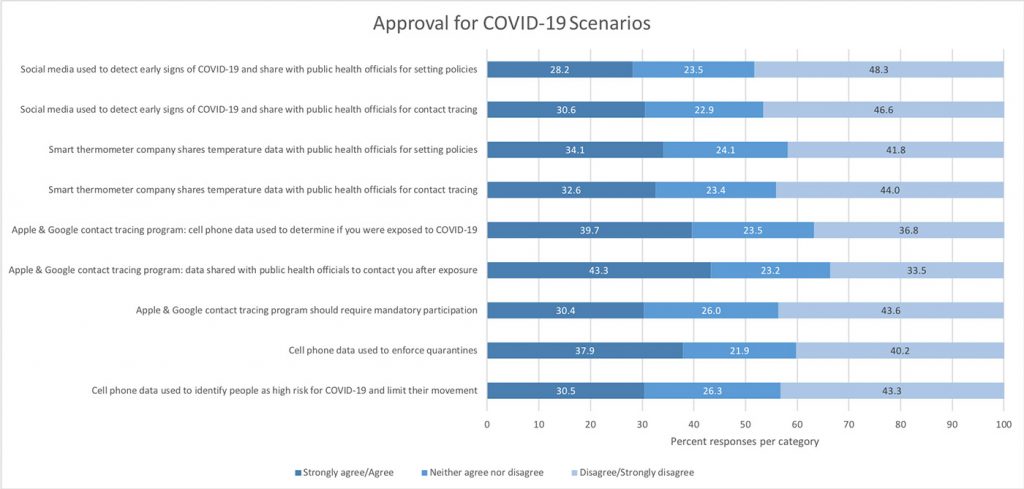Blog Post
U.S. Public Skeptical of Sharing Digital Data for COVID-19 Control
Little Support for Public Health Uses
Even in the midst of a pandemic, most U.S. consumers would not look favorably upon the use of their digital data for public health purposes, according to a new JAMA Network Open study by LDI Fellows David Grande, Nandita Mitra, Raina Merchant, David Asch, and Carolyn Cannuscio. These findings reveal some of the challenges in using social media and smartphone strategies, such as the contact tracing apps launched by Google and Apple, to curb the spread of COVID-19.
The authors presented nine different scenarios for data sharing in a national survey of 3,547 adults conducted in July 2020. The scenarios differed on the source of the digital data (social media, “smart” thermometer, or smartphone), whether the data would be shared with public health officials, and how the data would be used. As shown below, none of the tested scenarios received majority support, though some scenarios showed promise. Scenarios that had the most support were use of smartphones for digital contract tracing and for enforcement of quarantines.

Somewhat surprisingly, personal or familial COVID experience and local COVID rates were not associated with support, but political ideology was. Conservatives were less likely than liberals to support digital data usage for COVID-19 response.
Across nearly all scenarios, racial and ethnic minorities expressed stronger support than white and non-Hispanic populations. Although earlier research showed that in certain circumstances Black and Hispanic adults have more concerns around online privacy than white individuals, this increased support could reflect the inequitable impact of COVID-19 on racial/ethnic minority groups.
This study underscores the immense challenge public health departments face to convince the U.S. public to participate in digital efforts to trace and slow the spread of COVID-19 and future public health threats. Other countries have used digital contact tracing to combat the pandemic with some success; for example, South Korea used digital surveillance and testing to curb the spread of COVID-19, though such tactics come with costs to privacy and security concerns. Public health entities that seek to use such techniques in the U.S. should use advertising, trusted messengers, and other behavioral nudges to foster buy-in from the public. Legislation might be needed to provide updated and enhanced protections for digital consumers and reassure a wary public.
The study, Consumer Views on Using Digital Data for COVID-19 Control in the United States, was published in JAMA Network Open on May 19, 2021. Authors include David Grande, Nandita Mitra, Xochitl Luna Marti, Raina Merchant, David Asch, Abby Dolan, Meghana Sharma, and Carolyn Cannuscio.